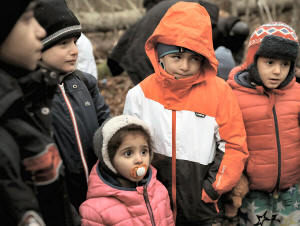How Minsk became a mecca for migrants travelling as tourists
 Send a link to a friend
Send a link to a friend
 [November 15, 2021]
By Charlotte Bruneau, Joanna Plucinska and Yara Abi Nader [November 15, 2021]
By Charlotte Bruneau, Joanna Plucinska and Yara Abi Nader
SULAIMANIYA, Iraq/HAJNOWKA, Poland
(Reuters) - When Kamaran Mohammed travelled with his wife and three
children to the Belarus capital Minsk last month from their home in
northern Iraq, they went as tourists.
They were among thousands of people provided with tourist visas in
recent months with the help of travel agencies in the Middle East
working in partnership with tour operators in Belarus, according to
documents and witness accounts.
A few days after arriving in Minsk, the family made its way to the
Belarus-Poland border, joining a wave of Iraqis, Syrians, Afghans and
others attempting the hazardous and sometimes deadly crossing into the
European Union to start a new life.
"The planes carry tourists that are not going for tourism," said
Mohammed, speaking on Thursday in his home in the northern Iraqi city of
Sulaimaniya.
"The Belarusian government knows very well that these people are not
tourists, but that they are going to the Polish border."
Mohammed and his family made it to Poland, but only briefly. They were
deported back to Iraq on Oct. 31, a reminder that spending thousands of
dollars and risking lives are no guarantee of settling in the EU.
Reuters could not independently verify his account.

The migrant crisis has stoked tensions between the West and Belarus'
ally Russia. Moscow has sent nuclear-capable bombers to patrol
Belarusian skies and nations bordering Belarus voiced alarm that the row
could escalate into military confrontation.
The European Union has accused Belarusian President Alexander Lukashenko
of orchestrating the influx of migrants to pressure it to back down over
sanctions slapped on his government.
Poland and Lithuania have produced documents, seen by Reuters, that they
say show at least one Belarusian state-owned travel company made it easy
for would-be migrants to visit from May, while a state carrier more than
doubled flights on a route popular with asylum seekers.
Lukashenko denies facilitating the crisis, although he has said he would
no longer hold back migrants due to the penalties imposed by the EU
after a disputed presidential election last year and subsequent
crackdown on protesters.
Reuters spoke to more than 30 migrants or would-be migrants from the
Middle East for this article in their homelands, on the Belarus-Poland
border and in migrant centres in Poland.
Around 20 specified what visas they travelled on and all said they were
for tourism. The documents released by Poland showed nearly 200 Iraqis
received visa support from a state-run travel company in Belarus to
visit for hunting and other trips.
Migrants and travel agents in Iraq and Turkey described the relative
ease with which they have obtained documents for passage to Belarus in
recent months.
Despite the cost - Iraqi migrants said they spent between around $1,250
and $4,000 reaching Minsk - thousands have made the journey, getting
visas with the help of Belarusian firms and taking commercial flights
that have become more frequent since the spring.
The surge in migrants has been aided by a small industry of travel
agents, companies, smugglers and drivers seeking to take a cut of the
profits, according to those travelling to or at the frontier.

Several migrants near the border told Reuters that Belarusian border
guards helped them try to cross into Poland or turned a blind eye when
they did so. Two migrants separately said they handed them wire cutters.
Belarusian authorities did not respond to requests for comment on
accusations that they facilitated the migrant crisis.
But Belarus' foreign ministry said on Monday allegations that Minsk had
engineered the crisis on its borders with the European Union were
"absurd".
Russian news agency RIA cited the ministry as saying Belarus had
tightened border controls and its state-owned airline Belavia has
carried no illegal migrants.
SAFER ROUTE TO EUROPE
Most migrants Reuters spoke to said they made the journey because they
saw no future for themselves or their children, be it in Syria or Iraq.
A handful said they were trying to enter the EU to reunite with friends
or relatives.
They saw a chance to get to Europe via land - less risky than by sea,
especially when travelling with young children. As 2021 went on, they
read on social media that visas were becoming readily available.
Middlemen and agents offered their services.
Hussein al-Asil is an Iraqi based in Ankara who provides travel services
to would-be tourists and migrants.
He said he arranged invitations for his clients from three Belarusian
partners and processed passports sent from Iraq. Once returned, their
owners could travel to Minsk via Turkey. According to Asil, it was much
harder for Iraqis to get visas for Belarus before this year.
Asil said he charged $1,250 per person - which he claimed made him one
of the cheapest travel agents.
"The (Belarus) embassy of course knows that this person is not going for
tourism," he said. "What kind of tourism would that be, to book a plane
ticket for $800 and get a visa for $1,250? They know that these people
are coming to go to Europe."
[to top of second column]
|

Children from a group of migrants gather in a forest near the
Polish-Belarusian border outside Narewka, Poland November 9, 2021. A
group of migrants was later guided out of the forest by Polish
border guards and taken to a detention centre. REUTERS/Kacper Pempel/File
Photo

Flights to Minsk became more frequent since the
spring.
Belavia, for example, flew 28 times from Istanbul to Minsk in
February, 2021, and 31 times in March. By July that had more than
doubled to 65, according to Flightradar24 data.
Turkish Airlines flights on the same route also
jumped, to 64 in July and August from 32 in March and April. In
October, both airlines flew a combined 124 times to Minsk.
The EU has moved to counter that. Amid pressure from Brussels,
Baghdad suspended flights from Iraq to Minsk this autumn.
On Friday, Belavia and Turkish Airlines confirmed they would no
longer take passengers from Yemen, Iraq or Syria to Minsk, except
for diplomats.
And on Saturday Cham Wings Airlines, a private Syrian carrier, told
Reuters it had suspended flights to Minsk.
'EVERY DAY FRIENDS LEAVE'
Once migrants arrive in Minsk, most move quickly to the border. City
residents said they had seen a large increase in people who appeared
to be from the Middle East waiting in malls, sleeping on benches and
buying provisions for their onward journey.
Some migrants who made it to Poland said they were beaten by
Belarusian border guards and chased back and forth across the
frontiers. They faced exhaustion, hunger, thirst and fear.
Belarus authorities did not immediately respond to a request for
comment on their accusations.
Umm Malak, a 26-year-old Iraqi woman weeks away from giving birth,
told Reuters that she and her family were shunted between Poland and
Belarus six times before she made it to a migrant centre in the
Polish city of Bialystok.
She said she, her husband and their three small daughters waded
through chest-deep water and hid in cold forests.
A Polish police spokesperson said police did not conduct activities
such as taking migrants back to the border. Neither the Polish
Border Guard nor Belarusian authorities responded to requests for
comment on her case.

Umm Malak may consider herself lucky.
Many migrants do not make it into the EU and are forced to try to
get back to Minsk - sometimes having to pay a bribe to do so - or
their homeland. At least eight migrants have died trying to cross
and fears are growing for the safety of others as harsh winter
conditions set in.
Despite the crackdown on flights from the Middle East to Minsk,
Fabrice Leggeri, director of the EU border agency Frontex, warned on
Friday that the bloc must be prepared for an increase in the number
of migrants trying to enter.
Numbers have already spiked. The Polish Border Guard said over
17,000 illegal attempts to cross the border were made in October,
more than double the attempts in September, and thousands of
migrants were camping out near Belarus' border with Poland.
Back in northern Iraq, in Said Sadiq, barber Warzer Ibrahim said
dozens of people from his town had left Iraq's northern Kurdistan
region for Belarus in recent weeks.
The 37-year-old father of two has decided to join them.
"I have a child who is eight, she can't write properly. Why? Because
school is not good. And I can see that the life of my children
doesn't look good," he said.
"I see the images every day, of people in the forest, but I am not
afraid. The hardship in Belarus is temporary. A week, two weeks. But
here, it is every day."
Iraq's Kurdistan regional government told Reuters it was
investigating local travel agents involved in the exodus, and blamed
politicians and smugglers for exacerbating the crisis.
Ibrahim said he had paid $1,600 for each of his family of four to
get to Minsk. Some would-be migrants said they had sold land and
homes to pay for fares, hotels, smugglers and bribes.

"Every day to see your good friend leave," Ibrahim added. "You know
each other for 20 years and then they leave for Belarus and you
don't know what will happen to them. That is hard. But I still say
go, and I am going because it is better than here."
(Charlotte Bruneau reported from Suleimaniya and Joanna Plucinska
and Yara Abi Nader reported from Hajnowka; Additional reporting by
Ako Rasheed and Ali Sultan in Sulaimaniya, Alan Charlish in Warsaw,
Abdallah Issam in Beirut, Can Sezer in Ankara, Natalia Zinets in
Kyiv, Dmitry Antonov in Moscow and Andrius Sytas in Vilnius; Writing
and Editing by Mike Collett-White)
[© 2021 Thomson Reuters. All rights
reserved.] Copyright 2021 Reuters. All rights reserved. This material may not be published,
broadcast, rewritten or redistributed.
Thompson Reuters is solely responsible for this content. |